
The book of Revelation is the final book of the New Testament. Its title is derived from the first word of the Koine Greek text: apokalypsis, meaning "unveiling" or "revelation". The Book of Revelation is the only apocalyptic book in the New Testament canon. It occupies a central place in Christian eschatology.
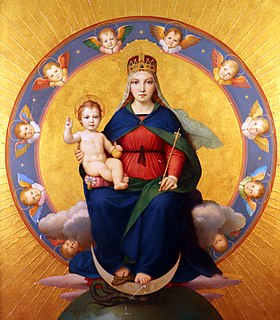
Apocalypse is a literary genre in which a supernatural being reveals cosmic mysteries or the future to a human intermediary. The means of mediation include dreams, visions and heavenly journeys, and they typically feature symbolic imagery drawn from the Hebrew Bible, cosmological and (pessimistic) historical surveys, the division of time into periods, esoteric numerology, and claims of ecstasy and inspiration. Almost all are written under pseudonyms, claiming as author a venerated hero from previous centuries, as with Book of Daniel, composed during the 2nd century BCE but bearing the name of the legendary Daniel.

Babylon the Great, commonly known as the Whore of Babylon, refers to both a symbolic female figure and place of evil mentioned in the Book of Revelation in the Bible. Her full title is stated in Revelation 17 as "Mystery, Babylon the Great, the Mother of Prostitutes and Abominations of the Earth". Revelation 17 states that the woman is actually a representation of "the great city that has dominion over the kings of the earth."
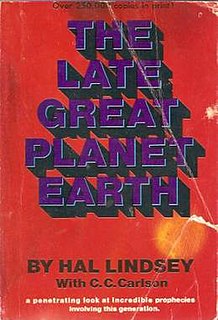
The Late Great Planet Earth is a best-selling 1970 book by Hal Lindsey with Carole C. Carlson, and first published by Zondervan. The New York Times declared it to be the bestselling nonfiction book of the 1970s. The book was first featured on a primetime television special featuring Hal Lindsey in 1974 and 1975 with an audience of 17,000,000 and produced by Alan Hauge of GMT Productions. It was adapted by Rolf Forsberg and Robert Amram into a 1978 film narrated by Orson Welles and released by Pacific International Enterprises. It was originally ghost-written by Carlson, whom later printings credited as co-author. Lindsey and Carlson later published several sequels, including Satan Is Alive and Well on Planet Earth and The 1980s: Countdown to Armageddon.
Apocalyptic literature is a genre of prophetical writing that developed in post-Exilic Jewish culture and was popular among millennialist early Christians. Apocalypse is a Greek word meaning "revelation", "an unveiling or unfolding of things not previously known and which could not be known apart from the unveiling".

The living creatures, living beings, or hayyot are a class of heavenly beings in Jewish mythology. They are described in the prophet Ezekiel's vision of the heavenly chariot in the first and tenth chapters of the Book of Ezekiel. References to the sacred creatures recur in texts of Second Temple Judaism, in rabbinical merkabah ("chariot") literature, in the Book of Revelation in the New Testament, and in the Zohar.

John of Patmos is the name traditionally given to the author of the Book of Revelation. The text of Revelation states that John was on Patmos, a Greek island where, according to most biblical historians, he was exiled as a result of anti-Christian persecution under the Roman emperor Domitian.
In Christian eschatology, historicism is a method of interpretation of biblical prophecies which associates symbols with historical persons, nations or events. The main primary texts of interest to Christian historicists include apocalyptic literature, such as the Book of Daniel and the Book of Revelation. It sees the prophecies of Daniel as being fulfilled throughout history, extending from the past through the present to the future. It is sometimes called the continuous historical view. Commentators have also applied historicist methods to ancient Jewish history, to the Roman Empire, to Islam, to the Papacy, to the Modern era, and to the end time.

Daniel 2 tells how Daniel related and interpreted a dream of Nebuchadnezzar II, king of Babylon. In his night dream, the king saw a gigantic statue made of four metals, from its head of gold to its feet of mingled iron and clay; as he watched, a stone "not cut by human hands" destroyed the statue and became a mountain filling the whole world. Daniel explained to the king that the statue represented four successive kingdoms beginning with Babylon, while the stone and mountain signified a kingdom established by God which would never be destroyed nor given to another people. Nebuchadnezzar then acknowledges the supremacy of Daniel's God and raises him to high office in Babylon.
"The Man Comes Around" is the title track from Johnny Cash's American IV: The Man Comes Around, released in 2002. It was written several years prior to the release of the album; however, Cash updated it for the album. It is one of the last songs Cash wrote before his death. Both sung and spoken, the song makes numerous Biblical references, especially to the Book of Revelation.
Daniel 7 tells of Daniel's vision of four world-kingdoms replaced by the kingdom of the saints or "holy ones" of the Most High, which will endure for ever. Four beasts come out of the sea, the Ancient of Days sits in judgment over them, and "one like a son of man" is given eternal kingship. An angelic guide interprets the beasts as kingdoms and kings, the last of whom will make war on the "holy ones" of God, but he will be destroyed and the "holy ones" will be given eternal dominion and power.
Daniel 8 is the eighth chapter of the Book of Daniel. It tells of Daniel's vision of a two-horned ram destroyed by a one-horned goat, followed by the history of the "little horn", which is Daniel's code-word for the Greek king Antiochus IV Epiphanes.
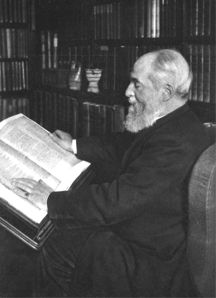
Henry Barclay Swete was an English biblical scholar. He became Regius Professor of Divinity at Cambridge in 1890. He is known for his 1906 commentary on the Book of Revelation, and other works of exegesis.
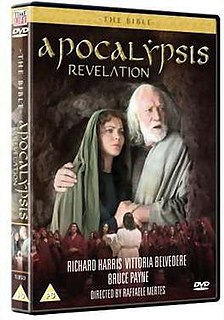
Apocalypse or The Apocalypse is a biblical telefilm produced for European television released in 2002 starring Richard Harris and co-starring Bruce Payne.
Christopher Charles Rowland is an English Anglican priest and theologian. He was Dean Ireland's Professor of the Exegesis of Holy Scripture at the University of Oxford from 1991 to 2014.
Jorunn Økland is a Norwegian gender studies expert and biblical scholar with a background in Classics. She is currently Director at the Norwegian Institute at Athens and Professor of Gender Studies in the Humanities at the University of Oslo, and former Director of its Centre for Gender Research (2010-2013). Her fields of expertise are Pauline Studies, ancient mediterranean material culture, feminist critique of religion, gender and sacred texts, Bible translation, and cultural/secular uses of the Bible.
Richard A. Horsley was the Distinguished Professor of Liberal Arts and the Study of Religion at the University of Massachusetts Boston until his retirement in 2007.
Carol A. Newsom is an American biblical scholar, historian of ancient Judaism, and literary critic. She is the Charles Howard Candler Professor Emerita of Old Testament at the Candler School of Theology and a former senior fellow at the Center for the Study of Law and Religion at Emory University. She is a leading expert on the Dead Sea Scrolls, Wisdom literature, and the Book of Daniel.

Daniel 1 tells how Daniel and his three companions were among captives taken by Nebuchadnezzar II from Jerusalem to Babylon to be trained in Babylonian wisdom. There they refused to take food and wine from the king and were given knowledge and insight into dreams and visions by God, and at the end of their training they proved ten times better than all the magicians and enchanters in the kingdom.
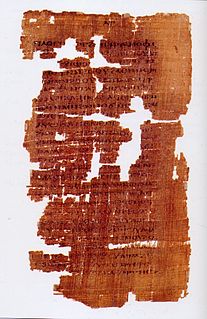
The Second Apocalypse of John is a pseudographical Greek Christian text sometimes classified as among the New Testament apocrypha. It is falsely attributed to John of Patmos. Its date is uncertain and has been placed as early as the late fourth century and as late as the mid-ninth.











